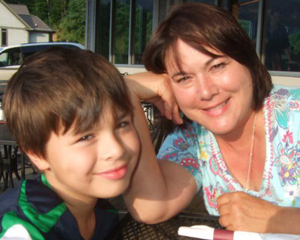“Why Is a Social Worker Coming Along?”
“Whew. I’m not afraid of you anymore. You’re really sweet.”
|
Wow. She was afraid of me? I was surprised by her statement but glad that she could say it if that’s how she felt. As a social worker I (almost always) support honest self-expression even when it is not something I’m thrilled to hear. I will call this Mom “Julie.” It’s not her real name. I want to thank her because this spontaneous expression of relief was a valuable reminder that my profession is often misunderstood.
Julie’s statement came toward the end of a productive home visit in which lots of ground was covered. Sitting in her living room, we had talked about so many things that were worrying her, including her child’s behavioral problems at school that were not related to his bleeding disorder. I could almost see the weight lifting from her shoulders. This was a visit with one of our new HoG families, which included a recently-diagnosed child with a bleeding disorder, his mother and young siblings. The child’s father was at work, but Julie’s concerns were his concerns. Both parents recognized that their fears were taking valuable time and energy away from their other children, one of whom had another health condition.
Because there seemed to be many questions about insurance and school issues, and because Julie was understandably overwhelmed, the HoG outreach nurse making initial contact by phone had suggested that I come along. When I called Julie to ask if that was okay she did seem hesitant for a moment. But once I explained my role as part of Hemophilia of Georgia’s family support system it seemed that her misgivings went away.
So when Julie brought up the fear factor after I had been there for over an hour, my eyes got pretty big and I said, “You were afraid of me? I guess the words ‘social worker’ mean different things to different people.”
And it’s so true.
I remember another parent, a father, saying to me years ago, “I don’t need food stamps and I don’t beat my kids. So why do I need a social worker?” He was saying this with humor in his voice, but it’s probably the way a lot of people think about us. It’s a curious thing, but a reality.
Social workers don’t have much time for personal PR. And that’s why I’m making the time for this blog. When I was working on my master’s degree in social work at Columbia University in New York City I was following a calling that had taken me away from my previous profession of journalism. As a student, I did an internship with homeless veterans suffering from Post Traumatic Stress Disorder. I did another internship on an AIDS unit in Brooklyn, back when the diagnosis was a near-certain death sentence and when little was known about the virus. I sometimes asked myself, “Cathy, what in the world were you thinking when you signed up for this?” But the calling to jump in and help overpowered my fears. The drop-out rate is high in social work schools and we were all encouraged to take a long look at our motives for being there. And the truth is that I love helping people. I love championing the underdog. I have a strong sense of justice.
At no time in my studies did I take a class on how to turn in parents to child protective services and have their children taken away from them. Because it is such an important subject, that was probably a big hole in my graduate level education. But honestly, it was the farthest thing from my thoughts. Still, I think it’s the first thing that comes to mind for many who hear the words “social worker.” Television has a lot to do with that.
I will say that during my nine years of employment at Children’s Healthcare of Atlanta at Scottish Rite I saw more child abuse and neglect than I ever wanted to see. It is real and probably under-reported. When it happens social workers are among the mandated reporters (along with doctors, nurses, teachers and many others) who are required legally and ethically to help keep these children safe. In fact, not reporting concerns about child abuse and neglect can result in loss of license and jail time. It’s taken that seriously – and it should be.
But here at HoG, my social work efforts focus mainly on finding resources, advocating in schools and other systems, problem-solving, staffing family events and offering emotional support. While I am qualified as an LCSW to provide therapeutic counseling, those clients needing on-going support should have someone in their community to fill that role. I am one of four social workers at Hemophilia of Georgia and my territory includes all of Fulton and Gwinnett counties and most of northern Georgia. So the right thing for me to do is help someone find a good counselor near home when the need is there. Mental health conditions such as depression, anxiety and trauma-related pain often are overlooked by our society. It is a specialty of my profession to see injury, illness and “bleeding” of the psyche in the same way that doctors and nurses see these things in body. Many in the medical field recognize this expertise among social workers and call on us whenever there is a mental health need or a need for family advocacy and support.
If you don’t know who your HoG social worker is, please just call the HoG office to find out. We’d love to talk to you!
Cathy Hulbert, LCSW
Hemophilia of Georgia Social Worker

